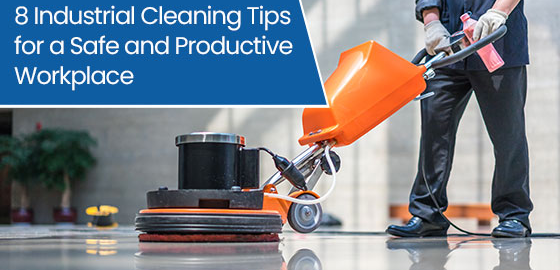8 Industrial Cleaning Tips for a Safe and Productive Workplace

Residential cleaning differs from commercial cleaning in terms of area and technique. Similarly, industrial cleaning is distinct from both these types. However, keeping industrial areas clean involves more than just making the factory and workspace spotless; health and safety considerations are also paramount.
With the potential for fire risks and trip and spill hazards ever-present on the factory floor, ensuring that these areas are properly cleaned, and using the right chemicals and tools, can mean the difference between being fully operational and being shut down.
1. Hazard Assessment
Understanding how the facility operates and the types of chemicals that may be used will help identify areas that can cause hazards such as fires, fumes, slips, and falls.
To prevent such hazards from becoming a real threat, keeping these areas clean is essential. For example, ensure that the garbage is emptied regularly, floors are cleaned and swept, and spill clean-up materials are nearby.
2. Correct Storage
Having all the necessary tools at hand makes the work easier and more efficient. However, leaving things lying around can create various health and safety issues.
Therefore, invest in proper storage solutions like shelves and tool chests. These storage options can be moved to facilitate cleaning the floors underneath and keep all tools in their proper place and off the floors.
Freeing up floor space also removes trip and fall hazards, making it safer for people to move around and perform their jobs without fear of falling.
3. Waste Receptacles
Industrial workplaces generate various types of waste, as well as more specialised waste, depending on the plant and the type of work carried out.
Having the right waste receptacles readily available for staff to use helps keep the workspace functional and safe.
For instance, using waste bins for paper and special receptacles for oil, grease, or other chemical by-products can reduce the risk of fumes and fire.
4. Cleaning and Maintenance
Regular cleaning doesn’t just keep the place looking nice but also allows you to carry out visual maintenance checks on equipment. This helps ensure that your valuable machines continue performing as intended.
Whether it’s the floors, windows, or the machines, you can inspect them for wear and tear just by a visual inspection. Cracks in the floor or broken panels should be dealt with as soon as possible before they worsen.
5. Expiration Dates
All products have an expiration date or, at the very least, a best-before date. Ensure that any product in the workplace is checked and used before its expiration date, or, if discovered after that date, discarded.
Routinely checking all supplies and bringing the oldest items to the front to ensure they are used first not only saves money but keeps all products used in a timely manner.
6. Cleaning Supplies
Having cleaning supplies on hand allows staff to quickly clean up spills or other accidents that occur.
While many cleaning products require special handling due to their nature, providing staff access to safe items allows the immediate area to remain hazard-free.
7. Safe Disposal
Cleaning the workplace is just part of the job. The majority of cleaning products used in industrial settings contain more harmful chemicals than those used in standard residential or commercial cleaning.
This means they cannot simply be poured down the drain after use but may require neutralisation before disposal or be disposed of in special containers. In such cases, the person using these chemicals may require additional PPE (personal protective equipment) to do so safely.
8. Office Assessment
While office spaces need the same attention as other commercial offices, those in industrial settings tend to require more scrutiny. This is because environmental particulates from the plant floor can find their way through vents and deposit on walls, floors, and even desks and cabinets in office spaces above or near the floor.
This can lead to hidden dangers if not cleaned properly, such as mould and bacteria growing out of sight. Using additional cleaning techniques to ensure that the offices receive a deeper clean will keep administrative staff and managers safe.
The Importance of Industrial Cleaners
Industrial cleaning in Toronto is a highly specialized industry, and it takes an elite team to ensure it’s done properly.
Ensuring that the right chemicals are used to clean certain areas prevents interactions that could lead to the production of toxic fumes or combustion. Even things like oil spills require specific clean-up protocols.
For common spaces and offices, removing dust and other debris that travels up through the vents from the production floor requires extra effort. However, this helps keep office staff safe and impress clients.
Whether it’s concrete floors, ventilation, carpets, or equipment and workstation cleaning, working with a company that is ISSA (International Sanitary Supply Association) certified, as well as fully bonded, insured, and current with all WSIB (Workplace Safety and Insurance Board) standards, is a requirement to ensure that everything is cleaned and disposed of properly.
Industrial Cleaning Toronto: Your Industrial Cleaning Team
RBC Clean has been working alongside industrial companies for over 60 years. We understand what it takes to keep the production floor clean and safe, as well as the office spaces for your staff and visiting clients.
Our customizable packages can take care of all your industrial cleaning needs. We also provide additional services for emergency cleaning, site visit preparation, and even tours. This way, all your requirements are taken care of by board-certified and regulated professionals.
Call us at 1-855-493-9259 or go online for a free quote to see how we can help you maintain and exceed the standards for health and safety.



